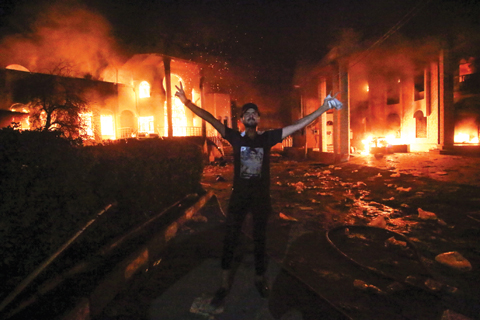Basra burns; Iraq's parliament holds emergency talks
 BASRA: An Iraqi protester stands flashing the victory gesture outside the burning headquarters of the Iranian consulate in the southern city of Basra. — AFP
BASRA: An Iraqi protester stands flashing the victory gesture outside the burning headquarters of the Iranian consulate in the southern city of Basra. — AFPBAGHDAD: Iraqi Prime Minister Haider Al-Abadi faced calls to resign yesterday as his alliance with a populist cleric who won May elections crumbled over deadly unrest shaking the country's south. The two leading groups in parliament called on Abadi to step down, after lawmakers held an emergency meeting on the public anger boiling over in the southern city of Basra. "We demand the government apologize to the people and resign immediately," said Hassan Al-Aqouli, spokesman for the list of Shiite cleric Moqtada Sadr that won the most seats in the election.
The announcement dealt a severe blow to Abadi's hopes of holding onto his post through a bloc-described as the biggest in parliament-unveiled just days earlier with Sadr and more than a dozen other groups. Ahmed Al-Assadi, spokesman for the second-largest list in parliament, the Conquest Alliance, condemned "the government's failure to resolve the crisis in Basra", where 12 protesters were killed this week in clashes with security forces.
The Conquest Alliance of pro-Iranian former paramilitary fighters was "on the same wavelength" as Sadr's Marching Towards Reform list and they would work together to form a new government, Assadi said. Abadi, whose grouping came third in the May polls, defended his record in parliament, describing the unrest as "political sabotage" and saying the crisis over public services was being exploited for political ends. His government has announced the allocation of an unspecified amount of extra funds for Basra, although demonstrators say that billions of dollars in emergency funding pledged in July has failed to materialize.
Anger over shortages
Basra has been rocked by protests since Tuesday, with demonstrators setting ablaze government buildings, the Iranian consulate and the offices of pro-Tehran militias and political parties. The anger flared after the hospitalization of 30,000 people who had drunk polluted water, in an oil-rich region where residents have for weeks complained of water and electricity shortages, corruption among officials and unemployment. At least a dozen demonstrators have been killed and 50 wounded in clashes with security forces, according to the interior ministry. Hours before parliament met, four rockets fired by unidentified assailants struck inside the perimeter of Basra airport, security sources said. Staff at the airport, which is located near the US consulate in Basra, said flights were not affected.
The attack came after a day of rage in the southern city where hundreds of protesters stormed the fortified Iranian consulate, causing no casualties but sparking condemnation. Abadi said he had instructed security forces to "act decisively against the acts of vandalism that accompanied the demonstrations". Iraq's Joint Operations Command, which includes the army and police, vowed a "severe" response with "exceptional security measures", including a ban on protests and group travel. Iranian foreign ministry spokesman Bahram Ghassemi denounced the "savage attack", Iran's Fars news agency reported.
'Neglect, corruption'
A spokesman for the consulate said that all diplomats and staff had been evacuated from the building before the protesters attacked, and that nobody was hurt. The wave of protests first broke out in Basra in July before spreading to other parts of the country, with demonstrators condemning corruption among Iraqi officials and demanding jobs.
Since then a total of at least 27 people have been killed. "We're thirsty, we're hungry, we are sick and abandoned," protester Ali Hussein told AFP on Friday in Basra after another night of violence. The anger on Basra's streets was "in response to the government's intentional policy of neglect", said the head of the region's human rights council, Mehdi Al-Tamimi. Iraq has been struggling to rebuild its infrastructure and economy after decades of bloody conflicts, including an eight-year war with Iran in the 1980s, the US-led invasion of 2003 and the battle against the Islamic State group.
In August, the oil ministry announced that crude exports for August had hit their highest monthly figure this year, with nearly 112 million barrels of oil bringing $7.7 billion to state coffers. Iraq, however, suffers from persistent corruption and many Iraqis complain that the oil wealth is unfairly distributed. Two months ago, Abadi pledged a multi-billion dollar emergency plan to revive infrastructure and services in southern Iraq, one of the country's most marginalized regions.- AFP










